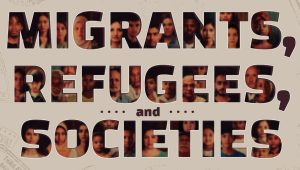Migration crucial to future growth – World Bank
Migration poses an opportunity to ensure growth and prosperity in both wealthy and low income countries, a new report from the World Bank says.
The report says many industrialised countries are facing problems associated with aging and diminished populations as well as intensifying global competition for workers.
At the same time low income countries are expecting rapid population growth adding pressure on young people to find jobs, the report says.
Titled, ‘World Development Report 2023: Migrants, refugees and Societies’, the report also points out that the number of refugees has tripled over the last decade and climate change threatens to fuel more migration.
“Populations across the globe are aging at an unprecedented pace, making many countries increasingly reliant on migration to realize their long-term growth potential,” the report says.’
 The report identifies this trend as a unique opportunity to make migration work better for economies and people.
The report identifies this trend as a unique opportunity to make migration work better for economies and people.
“Migration can be a powerful force for prosperity and development. When it is managed properly, it provides benefits for all people — in origin and destination societies.”
In the coming decades, the share of working-age adults will drop sharply in many countries, the report says.
For example, Spain, with a population of 47 million, is projected to shrink by more than one third by 2100, with those above age 65 increasing from 20 per cent to 39 per cent of the population.
Countries like Mexico, Thailand, Tunisia and Turkey may soon need more foreign workers because their population is no longer growing.
Apart from this demographic shift, the factors driving migration are also changing, making cross-border movements more diverse and complex, the report says.
“Today, destination and origin countries span all income levels, with many countries such as Mexico, Nigeria, and the UK both sending and receiving migrants,” the report says.
“The number of refugees nearly tripled over the last decade. Climate change threatens to fuel more migration. So far, most climate-driven movements were within countries, but about 40 per cent of the world’s population – 3.5 billion people – lives in places highly exposed to climate impacts,” it says.
The report says current approaches to migration fail to maximise the potential development gains of migration; they also cause suffering for people moving in distress.
“About 2.5 per cent of the world’s population – 184 million people, including 37 million refugees – now live outside their country of nationality. The largest share – 43 per cent – lives in developing countries,” the report says.
The report calls for urgency in managing migration better. It says the goal of policymakers should be to strengthen the match of migrants’ skills with the demand in destination societies, while protecting refugees and reducing the need for distressed movements.
The report provides a framework for policymakers on how to do this, emphasising international co-operation.
“Origin countries should make labour migration an explicit part of their development strategy. They should lower remittance costs, facilitate knowledge transfers from their diaspora, build skills that are in high demand globally so that citizens can get better jobs if they migrate, mitigate the adverse effects of ‘brain drain’, protect their nationals while abroad, and support them upon return, the report says.
“Destination countries should encourage migration where the skills migrants bring are in high demand, facilitate their inclusion, and address social impacts that raise concerns among their citizens. They should let refugees move, get jobs, and access national services wherever they are available.
“International cooperation is essential to make migration a strong force for development. Bilateral cooperation can strengthen the match of migrants’ skills with the needs of destination societies.
“Multilateral efforts are needed to share the costs of refugee-hosting and to address distressed migration. Voices that are underrepresented in the migration debate must be heard: this includes developing countries, the private sector and other stakeholders, and migrants and refugees themselves,” the report says.
Read the full report: World Development Report 2023: Migrants, Refugees, and Societies (worldbank.org)












